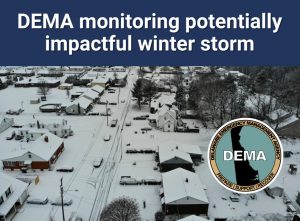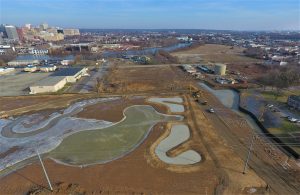“Fracking” Proposal Currently Lacks Sufficient Health and Safety Protections
Delaware will vote “No” at Monday meeting of the Delaware River Basin Commission
 The proposed regulations that would authorize drilling and hydraulic fracturing (“fracking”) to begin in the Delaware River Basin lack critical details on how public health and safety would be protected, Governor Jack Markell wrote today in a letter to the other voting members of the Delaware River Basin Commission.
The proposed regulations that would authorize drilling and hydraulic fracturing (“fracking”) to begin in the Delaware River Basin lack critical details on how public health and safety would be protected, Governor Jack Markell wrote today in a letter to the other voting members of the Delaware River Basin Commission.
In the letter, Markell made clear that Delaware’s representative would vote against the Natural Gas Development Regulations at the Commission’s meeting in Trenton this Monday.
“Instead of beginning the exploration in the Delaware River Basin and hoping we get a proper regulatory framework in place after-the-fact, it is Delaware’s view the Commission has an obligation to ensure that critical issues regarding well construction and operation are finalized first and not subject to subsequent dilution,” Markell wrote.
Over 3,000 wells have already been drilled in the Commonwealth of Pennsylvania to harness natural gas out of the Marcellus Shale. While the watershed area that would be opened up to drilling under the Commission’s proposed regulations covers only a small portion of the Shale, it serves as the primary water supply source for at least two-thirds of Delaware’s citizens.
“By far, the single most important issue for a downstream state like Delaware is whether the wells are being drilled, constructed, and operated in a manner that adequately protects our public and private water supplies. Once hydrofracturing begins in the basin, the proverbial “faucet” cannot be turned off, with any damage to our freshwater supplies likely requiring generations of effort to clean up. In this case, it is more important to get it right, than to be fast,” Markell wrote.
Markell made clear that he believes the nation can pursue the promise of this important domestic energy source without compromising the quality of our water supply. However, doing so demands the close coordination of multiple regulatory bodies including the state and local governments of Pennsylvania and New York, the Federal Environmental Protection Agency, and the Commission. Some of these regulatory offerings under consideration in each of these jurisdictions have (1) yet to be finalized; (2) have just been finalized but not fully evaluated; or (3) are final but inadequate to protect public safety.
For example, Pennsylvania’s legislative bodies are currently debating the science that underlies two separate pieces of legislation that would strengthen the rules regarding well construction and operation. In New York, scientists and citizens are still reviewing and commenting on New York’s draft regulations regarding well construction. Because those and other regulatory debates are still underway, Markell continues “to have significant concerns that the regulations may not adequately safe guard our regional water supply by adopting best practices for water withdrawal, siting and setback requirements, drilling and construction standards, ongoing operational protections, and clean up protocols and financial assurances should a release occur.”
The text of the letter is below.
November 17, 2011
The Honorable Governor Chris Christie
Office of the Governor
PO Box 001
Trenton, NJ 08625
The Honorable Governor Thomas W. Corbett
Office of the Governor
225 Main Capitol Building
Harrisburg, Pennsylvania 17120
The Honorable Governor Andrew P. Cuomo
Office of the Governor
NYS State Capitol Building
Albany, NY 12224
Colonel Christopher J. Larsen
Army Corps of Engineers
North Atlantic Division
302 General Lee Avenue
Brooklyn, New York 11252
Re: Delaware River Basin Commission’s Natural Gas Development Regulations
Dear Commissioners:
The Delaware River Basin Commission (the “Commission”) is scheduled to vote on the revised draft Natural Gas Development Regulations this Monday, November 21, 2011. This is an important issue and many of you have asked about Delaware’s intentions. This letter outlines Delaware’s position in advance of Monday’s meeting and the rationale for that position.
It is without question that the decisions we make regarding this issue can have a profound impact on the Delaware River Basin for generations to come. While I believe our nation can pursue the promise of this important domestic energy source without compromising the quality of our water supply, doing so in this case requires a thoughtful regulatory balance and coordination between several states, the federal government and the Commission. For the reasons stated below, I am not convinced we have yet struck that balance or have demonstrated that coordination, and that is why, after careful and deliberate consideration, Delaware will vote no on the adoption of the Commission’s draft regulations at this time.
On one hand, the Marcellus Shale formation offers the promise of providing a critical source of domestic energy, with its enticing potential to provide local, low-emission, and cost-effective energy. In addition, hydrofracturing in the Delaware River Basin has the potential to create significant numbers of direct and indirect jobs in Pennsylvania and New York, not to mention potential tax revenue for states struggling to meet budget shortfalls. On the other hand, as Lieutenant Governor Jim Cawley of Pennsylvania has stated, “no amount of economic benefit would justify the degradation of our land, air and water.”
For the past seventeen months of the Commission’s rulemaking process, Delaware’s interest has been simple. As a downstream state that could be adversely affected by poorly crafted and/or executed regulations, Delaware is focused on protecting the water quality throughout the Delaware River Basin. While this watershed only covers a small portion of the Marcellus Shale, it serves as the primary water supply source for at least two-thirds of Delaware’s citizens. For this reason, we have worked to ensure the Commission’s regulations strike an appropriate balance between potential economic development and responsible stewardship of our precious natural resources.
Striking this balance has proven to be very difficult and complicated because it requires the close coordination of multiple regulatory regimes: the state and local governments of Pennsylvania and New York; coupled with the Federal Environmental Protection Agency and this Commission. Some of these regulatory schemes have (1) yet to be finalized; (2) have just been finalized but not fully evaluated; or (3) are final but inadequate. As such, we continue to have significant concerns that the regulations may not adequately safe guard our regional water supply by adopting best practices for water withdrawal, siting and setback requirements, drilling and construction standards, ongoing operational protections, and clean up protocols and financial assurances should a release occur.
One only has to look at the prior experience in Pennsylvania to determine that the Commission should not adopt regulations without fully addressing critical issues regarding well construction and operation. After Range Resources announced it had discovered a large gas field in southwestern Pennsylvania in late 2007, businesses big and small inundated small towns in Pennsylvania, seeking permits to drill in the Marcellus Shale. More than 3,000 wells were drilled in just over three years, and only after the fact, in 2011, did scientists, environmental and business leaders convene as part of Governor Corbett’s Marcellus Shale Advisory Commission and offer recommendations regarding the safe, efficient and environmentally responsible extraction and use of natural gas reserves in Pennsylvania. In its final report, the Governor’s Marcellus Shale Advisory Commission noted several high profile incidents that underscore the potential impacts on ground and surface water caused by irresponsible hydrofracturing. As a result of its comprehensive and thoughtful review, the Commission offered 43 separate recommendations in July 2011 on how to better protect the public health and environment in Pennsylvania, many of which are not yet adopted by law, regulation or policy.
Instead of beginning exploration in the Delaware River Basin and hoping we get a proper regulatory framework in place after-the-fact, it is Delaware’s view the Commission has an obligation to ensure that critical issues regarding well construction and operation are finalized first and not subject to subsequent dilution. By far, the single most important issue for a downstream state like Delaware is whether the wells are being drilled, constructed, and operated in a manner that adequately protects our public and private water supplies. If the Commission is going to rely on the regulatory schemes of state and local governments on such issues, the Commission must review and evaluate such schemes in each of those states.
Otherwise, as EPA Regional Administrators Garvin and Enck properly noted in comments to this docket, the Commission should establish a minimum set of standards that any state requirements must meet. Because these state standards are still under development, Delaware has worked to improve the regulations with additional requirements for monitoring, financial assurance, site investigation following a release and remedial action; however, many smaller drilling operations will fall below the DRBC thresholds and will thus be governed by state regulations that are not yet final. Without a clear understanding of the legal and regulatory requirements regarding well construction and operation in New York and Pennsylvania, either through finalized and/or enacted state law or regulation, or through the Commission establishing minimum standards that must be met, I cannot conclude that the water resources in the basin will be adequately protected.
This does not mean that Delaware will refuse to move forward under any circumstances. In fact, I agree with Governor Corbett that the decision makers at all levels of government with respect to hydrofracturing should be guided by science, not emotion or desire for profit. But in Pennsylvania, the Commonwealth’s legislative bodies are currently debating the science that underlies two separate pieces of legislation that would strengthen the rules regarding well construction and operation. Further, in New York, scientists and citizens are still reviewing and commenting on New York’s draft regulations regarding well construction. Thus, the very efficacy of the Commission’s regulations depend heavily on state law or regulation but the decision makers in each state have yet to determine whether sound science will ultimately prevail. As such, this Commission is simply not able to properly evaluate these regulations based on the science at this time.
One final note on the process moving forward: the DRBC regulatory process has been a deliberate and thoughtful seventeen month process in which multiple public comment sessions were held, and more than 68,000 public comments were received and reviewed.
The Commission’s rulemaking process and the intense public interest on both sides of this issue reflect the importance of the decision the Commission will make. Delaware has repeatedly raised the issue of ensuring that the public has the opportunity to review and comment upon significant revisions to the draft regulations. However, the regulations presented for adoption on Monday, were released publicly on November 8 with very significant substantive changes upon which the public should have the ability to comment. Indeed, as recently as November 16, additional changes were made, and it is doubtful the public will have an opportunity to review them, let alone comment, before the public meeting. In the end, if we want the residents of our four states to have confidence in the final product, we must be completely transparent, including providing sufficient public comment opportunities in a manner similar to Federal and state regulatory processes.
In closing, the decision whether to allow hydrofracturing in the Delaware River Basin is a decision that will affect multiple generations of Delawareans. Once hydrofracturing begins in the basin, the proverbial “faucet” cannot be turned off, with any damage to our freshwater supplies likely requiring generations of effort to clean up. In this case, it is more important to get it right, than to be fast. As New York City Mayor Michael Bloomberg stated, “[b]ecause full-scale development of natural gas exploitation in the watershed could degrade water quality, a rush to regulate and drill risks the long-term viability of one of the most important drinking water sources in the United States.” This risk is a significant concern for Delaware and therefore, until we have confidence that the Commission’s Natural Gas Development Regulations, coupled with the state and local regulations upon which they rely, are adequately protective of this water supply, I have a duty to current and future generations of Delawareans to vote no.
Sincerely,
Jack A. Markell
Governor











































































